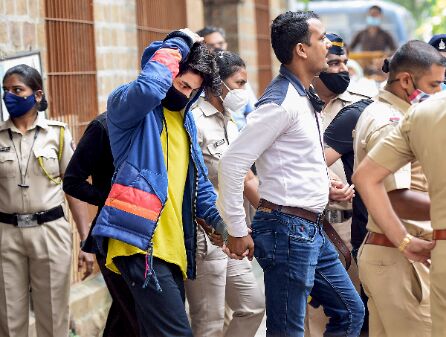Short memories
Every high-profile drug abuse case – like that of Aryan’s – stirs heated debate around celebrity culture, but falls way short of spelling out long-term solutions

When it comes to celebrity scandals, society has a short memory. Scandals come and go, while moral judgment, societal condemnation and the predictable redemption are all neatly packaged into bite-sized packages, for attention and retention spans are getting increasingly short. Admittedly, there is nothing wrong in enjoying a bit of raunchy celebrity gossip, but how we as a society deal with these drug scandals is becoming blatantly discomfiting.
A recent case is that of Aryan Khan, who has been arrested on drug abuse charges after an NCB bust. Following the announcement that Aryan had been fraught with these charges, the usual laundry list of clichés followed. Social media went berserk, as is wont, with people venting spleen on Shah Rukh Khan for being a negligent father, an irresponsible public figure. Every niece and uncle started ranting about a decadent celebrity culture and offered legal tidbits on what trouble Aryan may face, all pretend legal experts.
The media went viral too, with sensational reports and clinical analysis on whether or not Aryan cried, whether and what he ate, who visited him – the whole nine yards; that's typical of the media circus you now nonchalantly expect when such exposés happen. End of the day, though, what is the real outcome?
To quote the fecal news, Aryan, his fellow-indulgers and facilitators have been booked under the Narcotics Drugs and Psychotropic Substances Act, 1985 (NDPS) and the star kid is now purportedly helping the police catch the ones who supply the dreaded 'nirvana'. What needs to be understood, though, is that in the span of just a few days, we are already approaching Aryan's redemption arc. And very soon, he will be just another in a long list of celebrities who were associated with a drug scandal. In the end then, nothing would have really changed.
There is something truly concerning about today's drug culture in India and how our youth find such easy access to banned substances. Contact numbers for dealers are handed out on WhatsApp and Telegram repeatedly, as easily as are the numbers for one's favorite Chinese or pizza delivery outlets. Even as celebrities are caught frequently with a few grams of marijuana, ecstasy or whatever gets them singing (or singeing), the truth remains that anyone in the country can now easily procure much larger quantities of illicit substances from the local 'paan' shop. While these developments are alarming, the way we choose to deal with them is cause for real concern. One is reminded of the Sushant Singh Rajput case, when society and the new Indian media were more focused on condemning and slandering his name – today, it is the turn of another celebrity kid and his famous daddy, our very own King Khan.
A moot question remains unanswered and unrequited. When will we really have meaningful conversations on how to tackle the situation, the real problem at hand? How will we move beyond punishing a few to actually bringing about a systemic change? If the authorities are serious about dealing with the growing use of drugs and banned substances, why is there no debate and action around the legalization and regulation of these substances, especially as this is a succor for life for many thousands and lakhs of genuine, medically-needy individuals?
Clearly, much like Bollywood and the glitterati, our society too is suffused with the availability and widespread use of these banned substances. Yes, even as we are quick to point a condemning finger, many of us use these 'banned' substances in our own private spaces. This is a pond that runs deep and the authorities have done nothing more than but skim the surface every time a celebrity drug bust hits the headlines for a few days. Legalizing substances like marijuana would not only help cut back on black marketing but also bring in much-needed revenues and provide the authorities with a steady source of income. We would then perhaps not tax the oil pool and other more basic necessities as much.
And that brings us to a burning debate – is legalization way too radical for India as a society. Another sizzling question is whether we are ready as a society to discard our age-old prejudices and notions that legalization would allow easy(ier) access to banned substances to our youngsters and older folks?
If that be the case, then the authorities have little vetting space but to opt for a full-scale crackdown on the supply chains for such substances, starting with growers and producers and moving on to suppliers and the eventual users. I admit that such a crackdown may eventually be futile, leading to more black-marketing; a case in point in alcohol, where bans actually accelerate under-the-table dealings. But then, a true step would at least have been taken toward confronting a situation that needs to be figured out.
Time for statistics… According to the National Crime Records Bureau, a total of 59,906 cases were registered in 2020, under the NDPS Act. Of these, 55.5 per cent were for possession of quantities that are allowed for personal use in many countries. Even in the cases where trials have been completed, 81 per cent of the accused were convicted; mind you, that's double the conviction rate compared to heinous crimes like rape and murder.
Today, sadly, all we are doing is pretending outrage over a vexed problem that we all know exists, with each new scandal giving us an opportunity to express our outrage as proper, law-abiding citizens. Soon enough, we forget the old and move on to the new, another scandal involving celebrities that shines bright in our otherwise frightened and debilitated lives. This also begs a question – why are celebrities so shamelessly targeted? We all know that such 'busts' would have a feeble (if at all) impact on curtailing India's drug culture. Are celebrity busts then just better photo-ops for officials, to hold up and proclaim success, while reality and history tells us that nothing really changes? I know only one thing is for certain. Aryan's arrest and exposé is not going a game-changer, nor will it stoke the authorities' quest to confront drug trafficking and consumption.
In India, the business of drugs and banned substances is large indeed. Our geographical location plays a big part here, while our neighbours and their drug-delivering drones are not helping either. What we need to understand is where the chain begins, where the links are, and how it eventually reaches those that are the users. Our mountains are full of naturally-growing 'banned' substances. Our people are regularly using them. We need to figure out a policy and societal path here, lest we again miss the forest for the trees and lead to a larger crisis.
The writer is the Assistant Editor of MillenniumPost. Views expressed are personal



